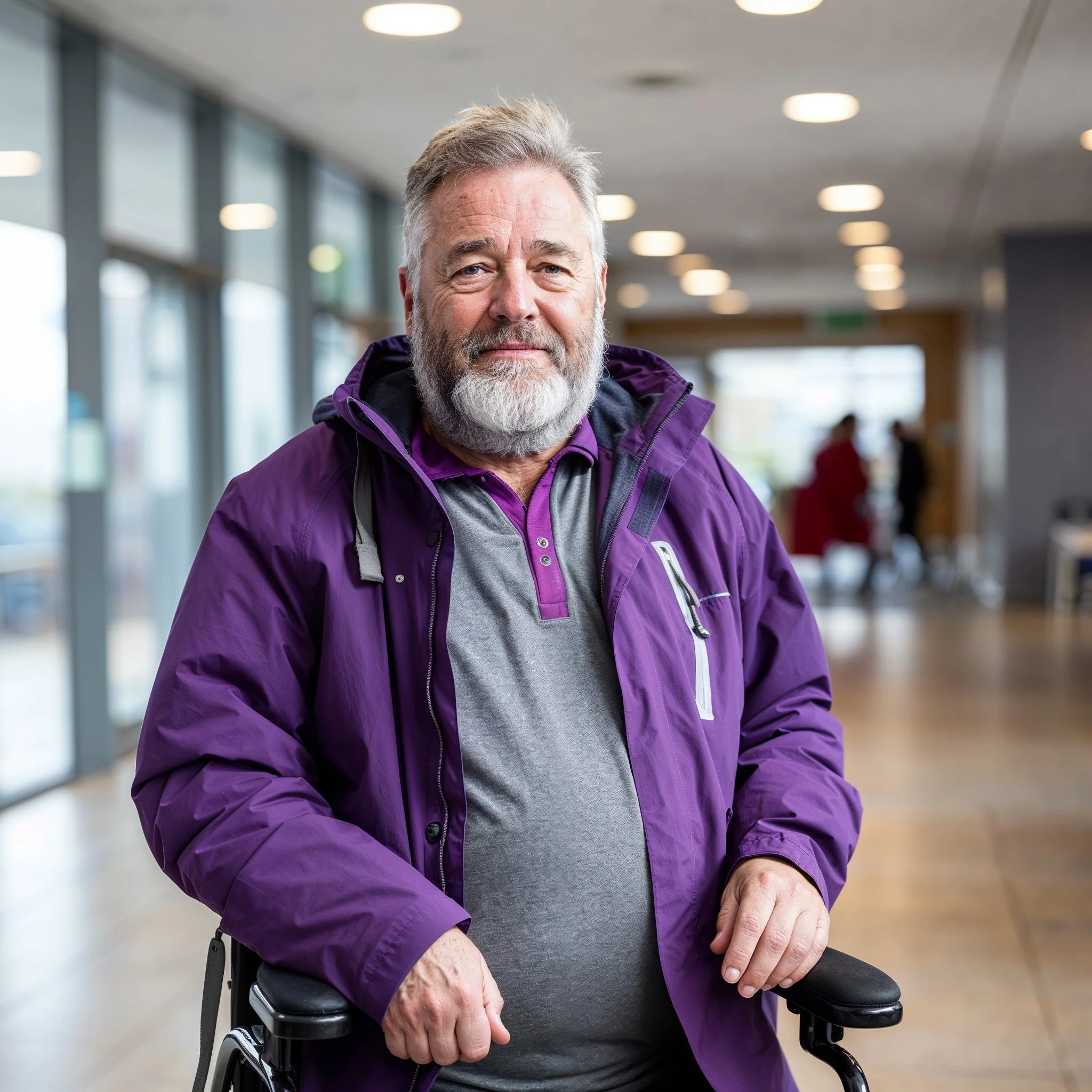Knowledge Hub
Could Cannabis for Parkinson’s Help You? Easy UK Prescriptions
Looking for quality-of-life treatments with less abrasive side effects? Our experts look at current medication and cannabis alternatives. Get started by finding a doctor.

Medical Cannabis and its potential for symptoms in Parkinson’s Disease
Parkinson’s Disease (PD) is a neurodegenerative disorder that primarily affects movement. It affects approximately 1% of the population with around 17,000 new diagnoses of Parkinson’s Disease every year in people aged 45 years and above. Parkinson’s Disease prevalence tends to increase with age, and it is more common in older populations. It is a chronic and progressive condition, and its prevalence may change over time due to factors such as aging populations, changes in diagnostic criteria, and improvements in data collection methods.
Parkinson’s Disease is characterized by the progressive loss of dopamine-producing neurons in the brain, particularly in the substantia nigra region. Dopamine is a neurotransmitter that plays a crucial role in controlling and coordinating movement. And as such a progressive loss of that functionality manifests itself primarily in tremors that tend to worsen as time goes on.
Whilst there has been a lot of research into different Parkinson’s treatments, none of the traditional Parkinson’s treatments offer a cure for the disease. Instead, all of the research into drugs for Parkinson’s treatment reflects a continuous effort to understand the underlying mechanisms of the disease and to develop effective treatments to alleviate its symptoms. In other words, the goal of all known Parkinson’s treatments is to improve the quality of life for individuals living with Parkinson’s Disease.
With its well reported improvements in quality of life for a range of conditions including spasticity for Multiple Sclerosis and other movement disorders, it is little wonder that medical cannabis has started to emerge as a potential pathway for Parkinson’s treatment in the UK. This article delves into the scientific research and patient perspectives on the use of cannabis, and in particular THC and CBD for Parkinson’s disease symptoms. Aimed at providing valuable insights for patients, caregivers, and healthcare professionals, this article navigates through scientific studies, patient experiences, and expert opinions to offer a well-rounded perspective on this controversial yet promising topic.
We will also explain how Script Assist can help patients suffering from Parkinson’s Disease who are looking for a private doctor that can prescribe medical cannabis as a potential cannabis for Parkinson’s treatment, via the easy-to-use Script Assist Patient App.
Want to find a private doctor in the UK that can prescribe cannabis as a potential Parkinson’s treatment pathway?

Start Today
Medical Cannabis and Parkinson’s: Your Journey With Script Assist
Follow these simple steps to find a private neurologist in the UK able to prescribe medical cannabis for Parkinson’s Disease.
01
Check your eligibility
Our 2-minute quiz will quickly show whether you’re likely eligible for for medical cannabis for Parkinson’s.
02
Find a Private Neurologist
Find a neurologist on our Find a Doctor page.
If your Private Medical Insurance covers your condition then look for a neurologist covered by your insurance company.
03
Book and Hold a Consultation
When your neurologist accepts your enquiry, simply book and join your consultation in the Script Assist Patient App.
Ready to Connect with a Private Neurologist That Can Prescribe for Parkinson’s? Find a Doctor Here
04
Pay and Track Your Prescription
Simply pay for your prescription through the Script Assist App, and then track it every step of the way.
Pay before 3pm to guarantee next-day delivery by 1pm.
Check Your Eligibility For Cannabis for Parkinson’s Now
05
Request Your Repeat
Easily request repeat prescriptions through the Script Assist App. .
Ready to Connect with a Private Neurologist for Parkinson’s? Find a Doctor Here

Contents

Understanding more about Parkinson’s Disease
Parkinson’s Disease is a chronic, progressive neurodegenerative condition resulting from the loss of the dopamine-containing cells of the substantia nigra. The resulting dopamine deficiency within the basal ganglia leads to a movement disorder with classical parkinsonian motor symptoms that we discuss in more detail below. Perhaps one of the more tragic realities of Parkinson’s Disease is that it does not tend to be clinically apparent until at least 50% of dopaminergic cell activity has already been lost.
Understanding the factual aspects of Parkinson’s Disease helps to grasp the physical manifestations experienced by individuals living with this chronic and debilitating condition. The symptoms are gradual and progress over time, but it is worth understanding how these symptoms present themselves in this complex condition, before exploring any potential Parkinson’s treatment options.
Symptoms of Parkinson’s Disease
- Tremors: Tremors are a common symptom of Parkinson’s Disease, often beginning in the hands at rest. These involuntary shakes are a characteristic feature, impacting daily activities.
- Bradykinesia (Slowed Movements): Bradykinesia results in slowed movements, making routine tasks more deliberate and measured. This symptom affects various activities, from walking to handling objects.
- Muscle Rigidity: Parkinson’s often leads to muscle rigidity, causing stiffness and limiting the normal range of motion. This rigidity can affect different muscle groups and impact overall flexibility.
- Balance Issues: Parkinson’s Disease frequently involves balance problems, increasing the risk of falls. The challenge of maintaining balance requires additional caution during daily activities.
- Facial Expression Changes: Facial expressions may become less pronounced, a common manifestation of Parkinson’s. This change can affect non-verbal communication and expressions of emotion.
- Speech and Voice Changes: Individuals with Parkinson’s may experience changes in speech, including a softer voice. This can impact communication, requiring adjustments for clearer expression.
- Gait Changes: Gait disturbances, often described as a shuffling walk, are common in Parkinson’s. The altered walking pattern can affect mobility and daily ambulation.
- Micrographia (Reduced Handwriting Size): Micrographia refers to the reduction in handwriting size over time, a distinctive feature in some Parkinson’s cases. This change can impact legibility and ease of writing.
- Sleep Disturbances: Parkinson’s may lead to sleep disturbances, including insomnia and vivid dreams. Managing these sleep-related challenges becomes a part of the overall care for individuals with the disease.
Want to find a private doctor in the UK that can prescribe cannabis as a potential Parkinson’s treatment pathway?

Download Our Patient App
Connect with a private specialist prescribing via Script Assist for your condition.

Find a Specialist
Quickly match with UK specialists prescribing for your condition.
Check Insurance Coverage
Review doctor profiles, compare fees, and verify insurance coverage.
Get Started
Settled on a doctor? Schedule your app consultation effortlessly.
Research into Parkinson’s Treatments
As mentioned earlier, there is no cure for Parkinson’s disease – any and all medications are designed to improve the quality of life of the individuals living with the condition and to help try to alleviate some of the excruciating symptoms listed above. Furthermore, when you consider that patients are only traditionally diagnosed once the condition has already spread beyond the point of clinical help to cure the disease, it helps to explain why Parkinson’s treatments in the UK can only help manage the symptoms.
Research into Parkinson’s treatments really began in earnest in the 1960’s, and has continued to the present day reflecting a continuous effort to understand the underlying mechanisms of the disease and to develop effective treatments to alleviate its symptoms.
The breakthrough in Parkinson’s treatment came with the discovery of levodopa, a precursor to dopamine. Researchers Arvid Carlsson, Oleh Hornykiewicz, and others demonstrated the effectiveness of levodopa in replenishing dopamine levels in the brain and relieving PD symptoms.
Then in the 1970’s, researchers developed dopamine agonists, drugs that mimic the effects of dopamine. Bromocriptine was one of the first dopamine agonists used in Parkinson’s treatment. The 1980’s focused on Monoamine Oxidase-B (MAO-B) Inhibitors which help prevent the breakdown of dopamine in the brain, with the introduction of Selegiline.
Research into Parkinson’s treatments from the 1990’s onwards has largely focused on developing and improving upon the Parkinson’s treatments already established. For example, Tolcapone and entacapone, COMT inhibitors were developed, which prolong the effects of levodopa by inhibiting its breakdown. And then in the 2000’s, researchers improved levodopa formulations, such as controlled-release versions, to manage motor fluctuations and extend the duration of symptom relief. And then in 2010, Safinamide, a drug with multiple mechanisms of action, was approved to be used as an adjunct to levodopa. Other Parkinson’s treatment drugs, such as trihexyphenidyl and benzatropine are known as Anticholinergic Drugs, can help control tremors and muscle stiffness, and Amantadine is an antiviral medication that also has antiparkinsonian effects, particularly in managing dyskinesias.
The side effects of these various Parkinson’s treatments vary depending on the patient and the medication, but the most commonly reported side effects that cause the most discomfort include:
- Nausea and Vomiting: Especially in the initial stages of treatment.
- Motor Fluctuations: “On-off” fluctuations between periods of symptom relief and a return of symptoms.
- Dyskinesias: Involuntary, erratic, and often excessive movements.
- Gastrointestinal Upset: Such as nausea or abdominal pain, diarrhoea or constipation
- Insomnia: Difficulty sleeping.
It’s crucial to recognize that the severity and occurrence of side effects can vary among individuals and the symptoms that they experience. Any and all side effects of Parkinson’s treatments should always be discussed with a healthcare provider. And in some cases the side effects may become intolerable, or the medicines prescribed ineffective. In such cases, it may be worth exploring medical cannabis, or even just CBD for Parkinson’s Disease.
Want to find a private doctor in the UK that is educated in Parkinson’s Disease CBD treatment in the UK?

Parkinson’s Treatments in the UK
In the UK, there is a clear Parkinson’s treatment pathway depending on the stage of the disease and the prevalent symptoms that need to be managed.
- Levodopa is usually offered to people in the early stages of Parkinson’s disease whose motor symptoms impact on their quality of life. Levodopa typically provides more improvement in motor symptoms and daily functioning, fewer adverse effects such as excessive sleepiness, hallucinations, and impulse control disorders, but may cause more motor complications such as dyskinesias than other drug classes.
- Oral monoamine oxidase-B (MAO-B) inhibitors (selegiline, rasagiline, or safinamide) typically provide less improvement in motor symptoms and daily functioning, fewer motor complications, and fewer adverse effects such as excessive sleepiness, hallucinations, and impulse control disorders than other drug classes.
- Oral dopamine agonists, such as pramipexole or ropinirole; or transdermal dopamine agonist, such as rotigotine, typically provide less improvement in motor symptoms and daily functioning, fewer motor complications, but more adverse effects such as excessive sleepiness, hallucinations, and impulse control disorders than other drug classes.
- There are also a range of drugs prescribed as an adjuvant to traditional licensed medications, and to offset some of the negative side effects of these treatments. These include Oral catechol-O-methyl transferase (COMT) inhibitors (such as entacapone or opicapone) for people who have developed dyskinesia or motor fluctuations despite optimal levodopa therapy, Oral amantadine for those who dyskinesia is not adequately managed by modifying existing antiparkinsonian therapy.
For many patients, there is also a range of non-motor symptoms and complications that come from Parkinson’s treatments in the UK. These include but are not limited to:
- Constipation, nausea and vomiting
- Pain
- Sleep disturbance and daytime sleepiness
- Depression and anxiety
- Dementia and cognitive impairment
Due to the large amount of research around medical cannabis to treat a number of these non-motor symptoms of Parkinson’s disease listed above, it is possibly unsurprising that research has also started to make waves specifically in relation to medical cannabis as a potential Parkinson’s treatment. For example, there is a large cohort of research pertaining to medical cannabis for pain, cannabis as a treatment for depression, cannabis for anxiety, cannabis for dementia, and cannabis – and specifically CBD for sleep.
Want to know more about cannabis as a potential Parkinson’s treatment…read on to understand more about the research into THC and CBD treatment for Parkinson’s!
Start your journey into medical cannabis to treat Parkinson’s Disease.
The Emergence of Cannabis in Parkinson’s Treatment

The legalization of cannabis in various countries has opened new avenues for its medical application. Particularly in Parkinson’s disease, patients have increasingly turned to cannabis for symptom management, and indeed countries that have legalized medical cannabis have seen a surge in its use among as a potential Parkinson’s treatment.
Studies like the one published in the Journal of Parkinson’s Disease in 2022 (Effects of Cannabis in Parkinson’s Disease: A Systematic Review and Meta-Analysis – PubMed (nih.gov) highlight this growing trend, emphasizing the need for a deeper understanding of cannabis’s role in Parkinson’s treatment. This meta-analysis of 5 randomized controlled studies and 18 other studies, did acknowledge that there was a potential benefit identified with respect to alleviation of Parkinson’s related tremors, anxiety, pain, improvement of sleep quality and overall quality of life. A more recent systematic review of clinical studies relating to cannabinoids to treat Parkinson’s Disease in 2023 (Cannabinoids in Treating Parkinson’s Disease Symptoms: A Systematic Review of Clinical Studies – PubMed (nih.gov)) concluded that Cannabinoids have been shown to safely offer important potential in treating motor symptoms in PD and some non-motor symptoms.

The Role of Tetrahydrocannabinol (THC) and Cannabidiol (CBD) in Parkinson’s
In the realm of cannabis research, two compounds stand out: CBD and THC. CBD, known for its non-psychoactive properties, has been the focus of studies exploring its impact on Parkinson’s symptoms. For instance, the Journal of Psychopharmacology in 2014 (Effects of cannabidiol in the treatment of patients with Parkinson’s disease: an exploratory double-blind trial – PubMed (nih.gov) examined CBD’s effects, suggesting potential therapeutic benefits. Conversely, THC, the psychoactive component, has been studied less due to its mind-altering effects. Understanding the distinct roles and impacts of these compounds is crucial for developing effective and safe cannabis-based Parkinson’s treatments.
The 2014 paper exploring the CBD treatment for Parkinson’s (Effects of cannabidiol in the treatment of patients with Parkinson’s disease: an exploratory double-blind trial – PubMed (nih.gov) pointed to a possible effect of CBD in improving quality of life measures on Parkinson’s patients who are not also suffering from other psychiatric comorbidities, but recognises that further research is required into Parkinson’s disease CBD treatment options.
Whilst there is a universal need for further clinical research into CBD and Parkinson’s Disease in order to truly ascertain the mechanism of action and its effects on motor symptoms, there are increasing qualitative studies showcasing the real world evidence for cannabis to treating Parkinson’s disease. One such survey, conducted by the Movement Disorders Journal in 2004 (Survey on cannabis use in Parkinson’s disease: subjective improvement of motor symptoms – PubMed (nih.gov)) revealed that in a questionnaire of 339 respondents, 25% revealed that they had taken cannabis and that 45.9% of those did report benefits of the plant in treating the symptoms of Parkinson’s Disease.
While much of the focus has been on motor symptoms, cannabis’s impact on non-motor symptoms is equally important. Research into cannabis use in people with Parkinson’s disease and Multiple Sclerosis (Cannabis use in people with Parkinson’s disease and Multiple Sclerosis: A web-based investigation – PubMed (nih.gov)) explored cannabis’s effects on mood, memory, fatigue, and obesity in PD patients. These findings open new avenues for addressing the comprehensive needs of PD patients, beyond just motor symptom management. And it is these quality of life indications, where cannabis has been known to have an impact.
Want to find a private doctor for a medicinal cannabis prescription as a potential Parkinson’s treatment in the UK?

How can Script Assist help you?
Script Assist can connect you to a private doctor that can prescribe cannabis for Parkinson Disease and ensure that you have a seamless experience.
- Easily find a Neurologist that can prescribe cannabis for Parkinson’s Disease
- Simply book and hold a consultation through the Script Assist App
- If you’re covered by insurance for Parkinson’s then you can check whether any of the doctors on our digital doctor directory are covered by your policy
- Seamlessly pay for your prescription through the Script Assist App
- Track your medical cannabis prescription all the way to your doorstep, with transparency at every step
- Simply request and pay for your monthly repeat request through the Script Assist App
- Pay by 3pm for next-day delivery before 1pm Monday-Saturday
Ready to Find a Neurologist knowledgeable in Parkinson’s Disease and CBD?






